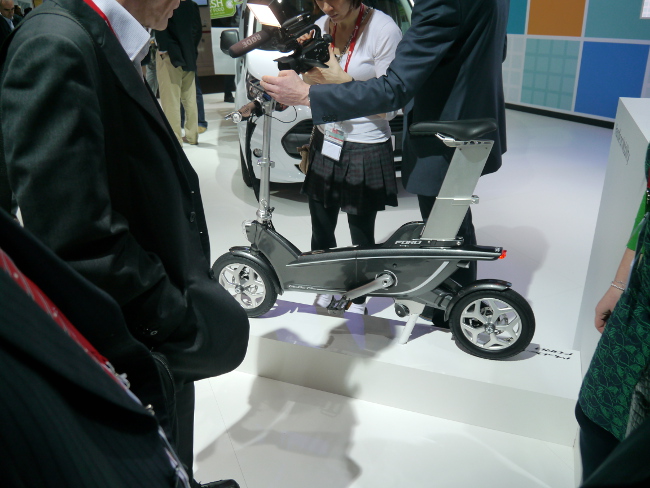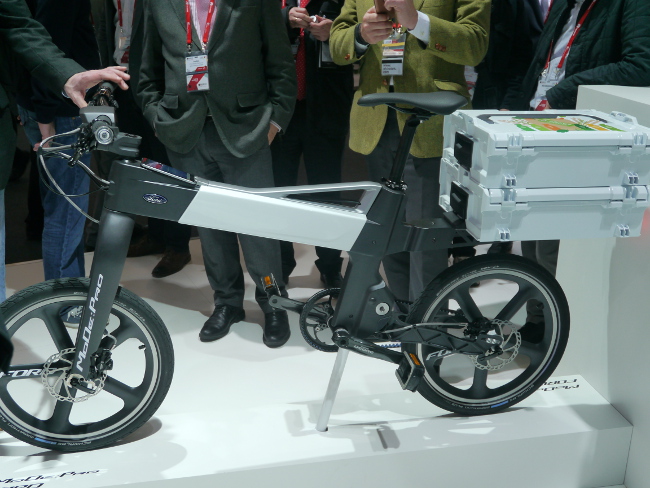As well as paving the way forward with its own fleet of electric and autonomous vehicles, the surprise mobility breakthrough from Ford at Mobile World Congress is not on four wheels, but rather on two.
The US car giant, which has R&D operations in Silicon Valley, Dearborn and in Germany, is experimenting with new electric bicycles that can be folded and stowed in cars like the Ford Focus Electric.
The idea is that commuters or business owners can ditch their cars and continue their journeys on bicycles that can be folded and carried into offices and onto trains.
The car giant has developed two bicycles, which include the Mode: Me, a bike that weighs just 13kg and the Mode: Pro, which can carry goods on a carrier and which weighs just 20kg.
Both vehicles can go at a maximum speed of 25 miles per hour, charge smartphones on the go, and carry many of the features and sensors that we’ve come to expect in electric vehicles. The features include sensors that warn you if a vehicle is too close and haptic sensors in the handlebars that vibrate when you have a vehicle too close or the GPS on your phone is telling you to make the next turn.
Ford has developed the Mode: Link app that enables route planning and gives up health and fitness, route planning and health and fitness diagnostics.
The bikes even come with a “no sweat” mode so that people in business suits can turn up at work or events without breaking a sweat or having to shower and freshen up.
Congestion costs Europe €100bn a year

Ford’s Mode:Me foldable electric bike
Ford’s long-term strategy director Barbara Samardzich explained that the decision to develop a bicycle of all things is part of Ford’s overall approach for smart cities.
Samardzich said that the average driver in the world today loses 111 hours a year due to congestion and this is costing the economy of Europe €100bn a year.
“There are a couple of megatrends driving this. There are 28 mega cities in the world today with populations of more than 10m. By 2030 there will be 41 of these megacities. We require smarter cars for increasingly smarter cities. Another factor is the rapid growth of the growing middle class which creates new challenges in terms of congestion, fuel usage and pollution. In particular we need to address air quality.
“We are faced with changing consumer attitudes. The millennials are delaying things like buying homes and attitudes to car ownership are also changing.”
Ken Washington, vice president of research at Ford said the challenge is to create accessible solutions for smart cities and Ford is actively investing in research into autonomous vehicles and using big data.
“It is all about changing the way the world moves in terms of better customer experiences, more flexible usage models.”
The data-driven driver

Ford’s Mode:Pro electric bike for businesses
Among the experiments taking place are data-driven car insurance in London where driver information is fed back in real-time to calculate exact insurance rates.
Ford is also experimenting with car sharing where ownership of vehicles among individuals is shared. “We are trialling this in 60 cities and 110 locations in Germany.”
He said that big data is going to proliferate the car industry and privacy is key. “Customers will own their data and we aim to be trusted stewards of that data.”
Don Butler, vice president of Connected Vehicles at Ford, said that work is also underway to ensure that the cars of the future will all communicate with each other.
“The idea is to use the community of drivers to improve the driving experience by connected cars talking to each other.
“We also want to use the network of vehicles to work in such a way that changes in driver behaviour will affect energy consumption,” Butler said.